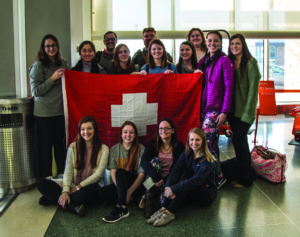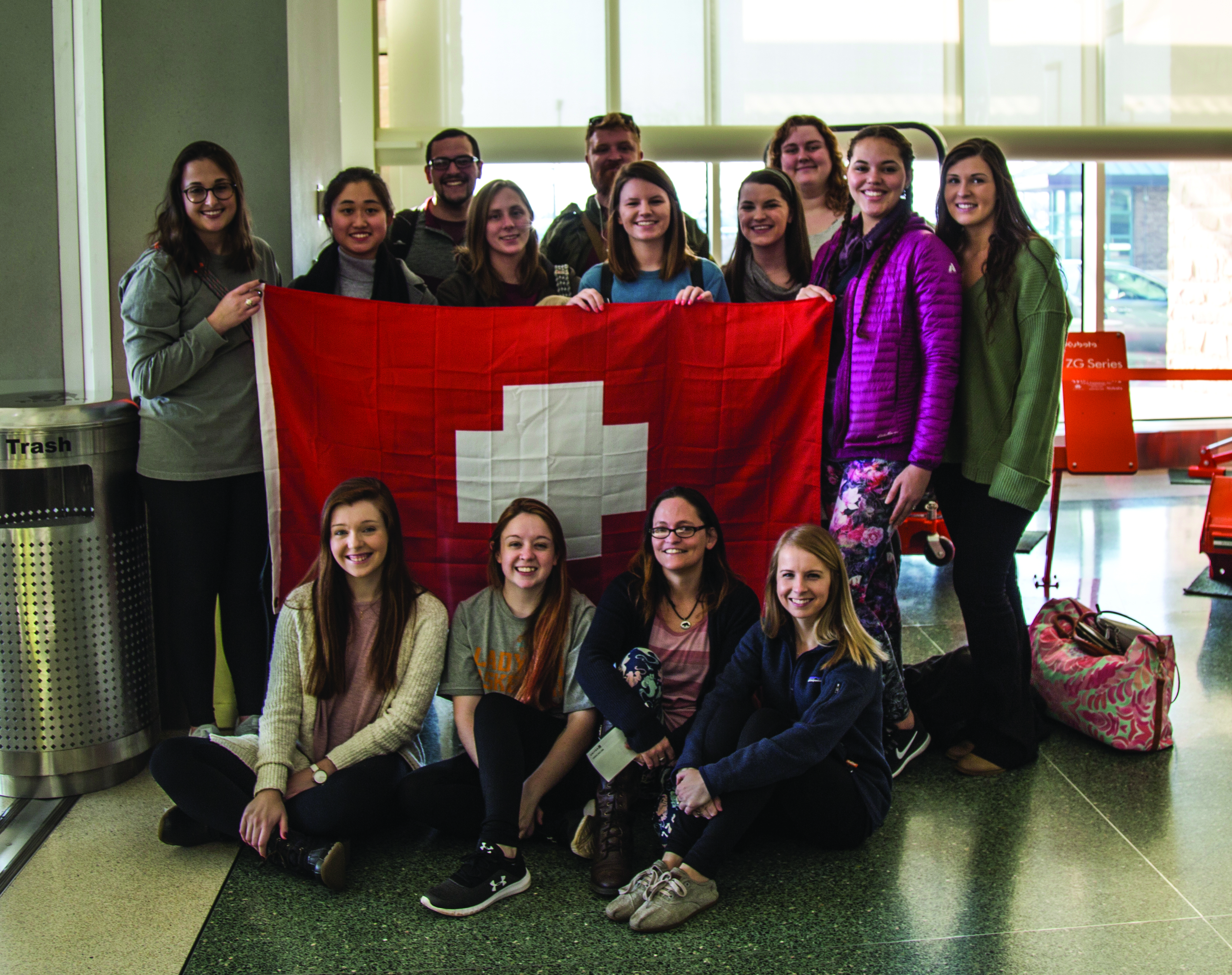Switzerland in perspective

It feels like it has been a year since I last sat in this cafeteria clanking away at my keyboard. How could I have possibly processed enough to describe all the things I’ve learned and seen in the past 10 days? When I close my eyes, and think about the trip, I see the Swiss Alps. I hear the traffic of Geneva at night coming from an open hotel window. I taste the cheese, breads and chocolates. I smell the street food, sizzling its way into my heart. And I still feel the strong impact of the presentations and the discussions in which we participated regarding international child welfare.
This spring break, a group of 14 students and two professors from Maryville College toured Switzerland studying international child welfare. The trip lasted for only 10 days, but will have an everlasting effect on the those of us who were lucky enough to experience it.
To provide a play-by-play of our travels through the country of Switzerland, having just returned last night and not yet had time to truly process the experience, would do an injustice to the grand experience of the trip. My intention is to let the images portray the fun aspect of the trip and my words to tell you how about the impact of what I’ve learned.
Traveling to a different country in this manor can be an arduous experience, with the long and sometimes turbulent flights, jet lag, constant packing and unpacking of luggage and the ever-difficult wrangling of a group of students for movement about the country. But, when I look past the wonderful and sometimes cumbersome aspects of this international trip, I realize how much I’ve learned about the subject we sought out to study.
During our time abroad, we were exposed to a barrage of facts, statistics, data, stories, ideas, concerns and general information about child welfare.
We’ve visited organizations who are on the forefront of the humanitarian effort on a global scale. We were welcomed at places like the United Nations (U.N.), the World Health Organization (WHO), Doctors Without Borders, the Red Cross and Red Crescent Society and the World Food Program. It was important to me personally to learn about what each organization is contributing– and in what ways–for the people and children who are suffering around the world.
The notion I want to explore is how reason begs us to examine the risk versus reward factor when it comes to putting one’s life on the line to help people in a country where conflict is a perpetual problem. The people who choose a humanitarian lifestyle choose to deny themselves the luxuries of normalcy in exchange for a life spent in a war torn or drought-ridden country. How does one justify this kind of lifestyle? What kind of reward do these individuals receive in the end? I think the answer to that question presented itself in a class that I’m currently taking back home at Maryville College. We’ve spent the last several weeks discussing the difference between the meaning of life versus the meaning in life.
Secularistic philosophers, who believe that life has no ultimate meaning beyond our daily lives, often speculate not on the meaning of life, but on what it means to have a meaningful existence in the little time we have in this reality–a meaning in life. One philosopher’s words resonated with me this week when considering the dangers of humanitarian work. Irving Singer, an American professor of philosophy who taught at the Massachusetts Institute of Technology, defined the difference between a meaningful life and a life of significance.
Singer said that, in order to have a meaningful life, one must simply feel fulfilled. He stipulates that fulfillment in one’s life is contingent upon one’s belief system. No other person can determine or judge what makes someone else feel fulfilled. In other words, if someone feels fulfilled by playing a video-game for the entirety of his or her life, that person has led a meaningful life. Singer also describes the next tier of a meaningful existence by describing what it means to live a life of significance, which he determines is higher than meaningfulness alone.
Singer describes a significant life as one in which a person spends his or her time caring more for others than one’s own life. By this standard, everyone person who spends his or her time caring for others more than for themselves is living the most significant and meaningful life possible. I can’t see myself being content at the end of my short life if I haven’t spent my time striving for a significant existence.
This is an example of how studying abroad in this fashion can change you as a student, and a person.
The travel study programs offered here at MC are amazing because they bring real context to subjects first learned in the classroom. For this trip, our weekly class explored the inner workings of the United Nations, then we were able to visit the very place we had studied, thus adding to our education. In the classroom, we learned about Doctors Without Borders, the Red Cross, the World Health Organization, the World Food Program, and then suddenly we were in these places. We were asking questions, taking notes and we were learning from the source. We were seeing and hearing things from the people and about the places about which we had just written papers a few weeks before. Full immersion education is priceless, and though these programs can be budget-breaking, there are a multitude of ways students can overcome the obstacles of financing.

